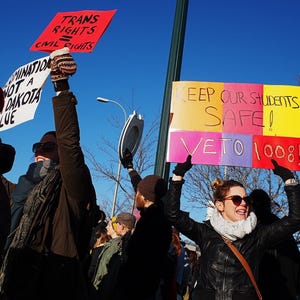Jillian Weiss weighed in on the recent spate of laws imposing transgender bathroom bans in an op-ed in USA Today:
April
13, 2016: North Carolina recently became the first U.S. state to
mandate discrimination against transgender people by statute, banning
them from using bathrooms and locker rooms that align with their gender
identity in government buildings and schools. The new law also
guts protections for lesbian, gay, bisexual and transgender people in
Charlotte and nine other municipalities.
This move and similar
ones in other states are terrible signals of intolerance, but beyond
that they make absolutely no sense. North Carolina started feeling an economic backlash so quickly that Gov. Pat McCrory signed an executive order Tuesday in an attempt to soften the message sent by the law, though the order has little impact on the law itself.
Then there’s McCrory’s reason for overriding the municipal ordinances — that the city of Charlotte committed “government overreach and intrusion” by saying transgender customers of private businesses had the right to use whatever restroom
seemed appropriate. That is in one sense a demand on those businesses.
But looked at another way, McCrory was suggesting that Charlotte had
overstepped its governmental role by reducing restrictions on restroom
use. If this seems illogical to you, join the club.
What makes
state laws like these even more irrational is that transgender people
are currently protected by federal law. They are protected in their use
of gender-conforming bathrooms in schools by Title IX of the Education Amendments of 1972. The Occupational Safety and Health Act and Title VII of the Civil Rights Act of 1964 have
been interpreted to cover gender-appropriate restrooms in the
workplace. There are constitutional provisions requiring equal
protection of the law and a due process right to privacy that apply to
state laws restricting access to public accommodations. And the
Affordable Care Act protects people in medical facilities.
Even so, 44 bills targeting the LGBT community were introduced in state legislatures in the first three months of 2016. The Republican National Committee has called for these actions.
These statewide attempts to make an end run around federal law, using
irrational fear-mongering to vilify an already vulnerable population,
have already resulted in a federal lawsuit in North Carolina.
The
five-count lawsuit was filed in U.S. District Court last month by
Lambda Legal, the ACLU, the ACLU of North Carolina and Equality North
Carolina on behalf of two transgender people, an employee and a student
at the University of North Carolina, as well as a law professor at North
Carolina Central University Law School. The suit alleges violation of
the Constitution’s equal protection clause and due process right to
privacy, and the sex discrimination provisions of Title IX of the
Education Amendments of 1972.
There will be no shortage of experts available to testify for the plaintiffs. The scientific data regarding transgender identity
are becoming quite clear. I wouldn’t be surprised to see the federal
Department of Justice weighing in at some point. It already has done so
in a number of cases against state governments that have taken the
position that federal law doesn’t protect transgender people. Other
agencies are reviewing whether violations of federal law would require cutting billions in funding to North Carolina.
The Equal Employment Opportunity Commission was my partner in a recent case against Deluxe Financial Services
in Minnesota federal court. The result was a public consent decree
filed in federal court in which Deluxe agreed to make an apology to
Britney Austin, change its internal policies, and pay our client for the
emotional distress she had to endure. A recent case against Lakeland Eye Clinic,
which I litigated in Florida federal court with the EEOC on behalf of
Brandi Branson, also resulted in a public consent decree.
POLICING THE USA: A look at race, justice, media
So
many federal courts have specifically held that federal laws
prohibiting sex discrimination also include sex discrimination against
transgender people that such protections should be considered a given.
For example, just this year, the U.S. Court of Appeals for the 11th
Circuit, covering Georgia, Florida and Alabama, ruled in favor of my client Jennifer Chavez, reiterating that sex discrimination includes discrimination against a transgender person for gender non-conformity.
I
have personally handled about 30 cases of transgender discrimination in
the past several years, and I can say with confidence that the dire
consequences predicted by the opponents of equality have not come to
pass in any U.S. jurisdiction. The reasoning of the legislators behind
the push to target transgender people defies logic. They are crusading
against a tiny minority that poses no real threat. They have invited
costly federal litigation at a time when there isn’t a budget for such
adventures. Most important, they are making businesses hesitant to align
themselves with states and politicians that have declared themselves to
be backwaters, afraid of a changing world.
Jillian T. Weiss, a professor of law and society at Ramapo College of New Jersey and founder of a firm
that represents transgender people who have experienced discrimination,
is executive director of the National Transgender Bar Association now
in formation.
In addition to its own editorials, USA TODAY publishes diverse opinions from outside writers, including our Board of Contributors. To read more columns like this, go to the Opinion front page and follow us on Twitter: @USATOpinion.

